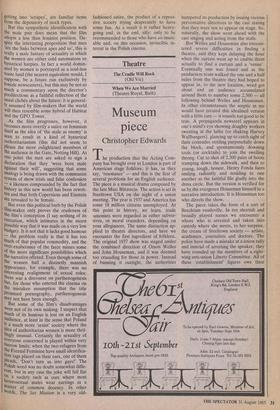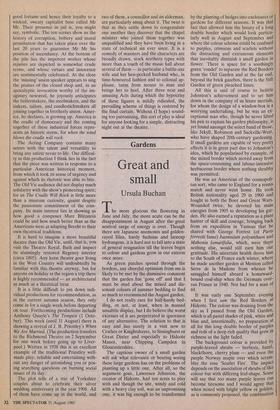Theatre
When We Are Married (Theatre Royal, Bath)
Museum piece
Christopher Edwards
The production that the Acting Com- pany has brought over to London is part of American stage • folklore; it has, as they say, 'resonance' — and this is the first of several problems for an English audience. The piece is a musical drama composed by the late Marc Blitzstein. The action is set in Steeltown USA on the night of a union meeting. The year is 1937 and America has some 18 million citizens unemployed. At this point in history, we learn, trade unionists were regarded as either subver- sives, or moral crusaders, depending on your allegiances. The same distinction ap- plied to theatre directors, and here we encounter the first ingredient of folklore. The original 1937 show was staged under the combined direction of Orson Welles and John Houseman, and it was deemed too crusading for those in power. Instead of banning it outright, the authorities hampered its production by issuing various preventative directives to the cast stating that they were not to appear on stage. So, naturally, the show went ahead with the cast singing and acting from the stalls.
But Welles and Houseman also encoun tered severe difficulties in finding a theatre, and they kept delaying the hour when the curtain went up to enable them actually to find a curtain and a 'venue'. Eventually one was found and as the production team walked the one and a half miles from the theatre they had hoped to appear in, to the new location, word got about and an audience accumulated around them to number some 2,500 — all following behind Welles and Houseman. In other circumstances the sceptic in me would have treated this idealised version with a little care — it sounds too good to be true. A propaganda newsreel appears in one's mind's eye showing doughty workers sweating at the lathe (or shaking Harvey Wallbangers), glancing up to catch sight of their comrades striding purposefully down the block, and spontaneously downing tools (or cocktails) to join the swelling throng. Cut to shot of 2,500 pairs of boots tramping down the sidewalk, and then to young, tough, honest, Henry Fonda faces smiling radiantly and nodding to one another as the faithful file gladly into the dress circle. But the version is verified for us by the evergreen Houseman himself in a narrative introduction. It is Houseman too who directs the show.
The piece takes the form of a sort of Brechtian vaudeville. In ten shortish and broadly played scenes we encounter a whore who is arrested and taken into custody where she meets, to her surprise, the cream of Steeltown society — artists, academics, journalists and doctors. The police have made a mistake at a union rally and instead of arresting the speaker, they have rounded up the members of a right- wing anti-union Liberty Committee. All of these 'establishment' figures owe their good fortune' and hence their loyalty to a wicked, sweaty capitalist boss called Mr Mr. Their presence in jail is, you might say, symbolic. The ten scenes show us the history of corruption, bribery and moral prostitution that has taken place over the last 20 years to guarantee Mr Mr his position of ascendancy. At the bottom of the pile lies the impotent worker whose injuries are depicted in somewhat crude terms, and whose virtues and innocence are sentimentally celebrated. At the close the 'missing' union speaker appears to sing the praises of the closed shop and, in an apocalyptic invocation worthy of the im- aginary newsreel, he joyously anticipates the boilermakers, the steelmakers, and the tinkers, tailors, and candlestickmakers all joining together in brotherly union. Amer- ica, he declares, is growing up. America is the cradle of democracy and the coming together of these industrial forces repre- sents an historic storm, for when the wind blows the cradle will rock.
The Acting Company contains many actors with the talent and versatility to bring any satiric revue to life. Our difficul- ty in this production I think lies in the fact that the piece was written in response to a particular American historical moment, from which it took its sense of urgency and against which its rhetoric was able to bite. The Old Vic audience did not display much solidarity with the show's pioneering spirit; for us The Cradle Will Rock is little more than a museum curiosity, quaint despite the passionate commitment of the com- pany. Its main interest lies in showing us how good a composer Marc Blitzstein could be and how much better than us the Americans were at adapting Brecht to their own theatrical traditions.
It is hard to imagine a more beautiful theatre than the Old Vic, until, that is, you visit the Theatre Royal, Bath and inspect its stunningly restored Regency interior (circa 1805). Any keen theatre goer living in the West Country will undoubtedly be familiar with this theatre anyway, but for anyone on holiday in the region a trip there is highly recommended — an architectural as much as a theatrical treat.
It is a little difficult to pin down indi- vidual productions for recommendation, as in the current autumn season, they only come in for a single week before departing on tour. Forthcoming productions include Anthony Quayle's The Tempest (1 Octo- ber). This week (until 31 August) there is showing a revival of J. B. Priestley's When We Are Married. (The production transfers to the Richmond Theatre on 2 September for one week before going up to Liver- pool.) Written in 1938 this is an excellent example of the traditional Priestley well- made play; reliable and entertaining with- out any danger of astonishing you or pos- ing searching questions on burning social issues of its day.
The plot tells of a trio of Yorkshire couples about to celebrate their silver wedding anniversary in the year 1908. All of them have come up in the world, and two of them, a councillor and an alderman, are particularly smug about it. The twist is that as they settle down to congratulate one another they discover that the chapel minister who joined them together was unqualified and they have been living in a state of technical sin ever since. It is a comedy of manners and the characters are broadly drawn, stock northern types with more than a touch of the music hall about several of them — in particular a battle-axe wife and her hen-pecked husband who, in time-honoured fashion and to colossal ap- plause, turns from mouse to man and brings her to heel. After three neat and amusing Acts during which the hypocrisy of these figures is mildly ridiculed, the prevailing scheme of things is restored by the final curtain. Without (I hope) sound- ing too patronising, this sort of play is ideal for anyone looking for a simple, distracting night out at the theatre.











































 Previous page
Previous page